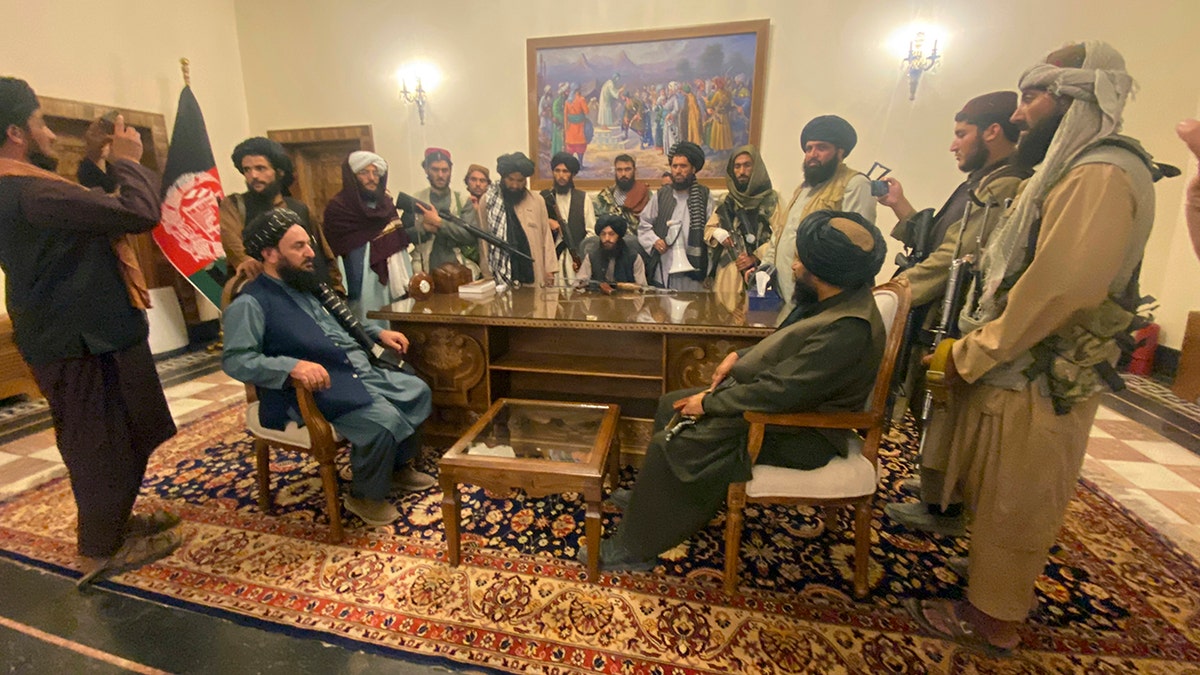Media top headlines September 1
In media news today, ABC's Martha Raddatz pummels Biden's speech on Afghanistan withdrawal, Meghan McCain rips longtime family friend Biden after withdrawal speech, and the Pentagon acknowledges Americans are 'stranded' in Afghanistan despite Psaki claiming term was 'irresponsible’
The Taliban is firmly in control of Afghanistan following the U.S. military's departure, and experts don’t think there will be a free press under the new regime because the group prefers propaganda and barbaric treatment of women over the pillars of democracy.
"Basic freedoms are not tolerated, freedom of the press being one of them," Fox News contributor Daniel Hoffman said. "It's a terrorist state. They're going to shut down all sorts of freedoms. That's the legacy that we've left behind."
Hoffman, who served as director of the CIA Middle East and North Africa Division, said the Taliban simply doesn’t care for America or what it stands for, and the group shouldn’t be expected to realistically comply.
TALIBAN CLAIMS IT'LL BE MORE MODERATE, BUT KILLINGS CONTINUE IN AFGHANISTAN
"I don't think there's any expectation that these guys are going to respect women's rights or freedom of the press or any other stuff that, look, they just fought a 20-year war against us. They don't like us," Hoffman said.
"What they don't like about us is freedom, liberty and democracy, those things. Two pillars of democracy or freedom of the press and the rule of law," he continued. "So forget about both of those things. That's not happening, not in Taliban land."

Taliban fighters take control of Afghan presidential palace after the Afghan President Ashraf Ghani fled the country, in Kabul, Afghanistan, Sunday, Aug. 15, 2021. (AP Photo/Zabi Karimi)
The Taliban has insisted that their fighters would not interfere with businesses and pledged to respect "women’s rights" shortly after taking control of Kabul earlier this month, but most educated observers are highly skeptical. Reports of executions and forced marriages are already dampening any hope of the Taliban modernizing for the sake of diplomatic relations with other nations.
Afghans have an uncertain future under Taliban rule, and Veteran U.S. Navy SEAL Jimmy Graham agrees journalism is one of the many industries that will suffer.
"It is not at all possible for a free press to exist in Afghanistan under the control of the Taliban," Graham told Fox News. "Despite what it said for cameras, they have no intention of changing their core beliefs."
Graham, who is also a retired Protective Officer for the CIA’s Global Response Staff and a fellow in community safety at the Centennial Institute, is specifically concerned about the Taliban’s infamous, brutal history of treatment toward women.
"Women will be enslaved, citizens will be terrorized, and anyone who opposes their agenda of evil will be targeted and even executed," he continued, noting the U.S. won’t be able to help female journalists targeted by the Taliban going forward.
"Any intelligence that was readily available by having personnel on the ground will be next to impossible to obtain. Intercepting attacks will become more and more difficult, and we will likely go from being active to reactive," he said. "That will be very costly."
Female journalists have already reportedly been threatened simply for showing up to work since the group seized control. Shabnam Dawran, an anchor for Afghan’s RTA Pashto, claimed in a video that she was refused entry into her workplace under the new Taliban regime.
UNESCO, the United Nations’ cultural agency, reported that Afghanistan was home to 203 TV channels, 349 radio stations, and 1,327 print outlets before the Taliban seized control. In 2020 there were 1,139 women journalists in the country between the various outlets, according to UNESCO.
THESE ARE THE US SERVICE MEMBERS KILLED IN THE KABUL AIRPORT ATTACK
The number is likely to drop significantly and Afghanistan's TOLO News reported that "numerous reporters and media staff -- mainly females -- are no longer working and living in uncertainty" following the Taliban takeover.
"The fate of numerous reporters is not known. The Taliban should let female media staff work because most of them are the only breadwinners for their families," female reporter Nazifa Ahmadi told the Afghan-based news organization.
While many Afghan journalists are fearful they won’t be able to work, others are scared for their safety.
Former State Department spokesperson Morgan Ortagus doesn’t buy claims the Taliban has evolved and wouldn’t discriminate against women going forward. In fact, she feels any reporter who utters a negative word about the Taliban could be in danger.
"No reporter will dare speak or publish the truth knowing the result could be a bullet in their head," Ortagus told Fox News.
"When the Western cameras leave and if our attention turns away, the Taliban are sure to revert to their 25-year history of brutality, especially toward women," Ortagus continued. "The most important thing the West can do is to continue documenting and watching their behavior, and demonstrating clear consequences for oppression of women and journalists."

Taliban fighters take control of Afghan presidential palace after the Afghan President Ashraf Ghani fled the country, in Kabul, Afghanistan, Sunday, Aug. 15, 2021. (AP Photo/Zabi Karimi)
Afghan-based journalists penned an open letter calling for the United Nations and other human rights organizations to protect them against threats, according to TOLO. The letter was signed by 150 reporters, cameramen, and photographers who urged the world to help defend Afghan journalists who worked to defend freedom of speech over the last 20 years but could now be in danger following the Taliban takeover.
"Considering the increasing challenges and threats facing media workers, as well as their families and property, we urge the United Nations and donor countries to take action to save our lives and our families," the letter said, according to TOLO.
One Afghan reporter told TOLO that his peers are "living in an uncertainty" without any idea what will happen to journalists going forward. "We do not know what will happen to us and our future. The world countries must hear our voice," reporter Rafiullah Nikzad said.
The editor-in-chief of Kabul News told TOLO that the situation for media is "worrying" in Afghanistan and the news organization is having a hard time even receiving a response to inquiries to the Taliban.
"No one is responding to us and this situation has created many obstacles for reporters," Kabul News top editor Ehsanullah Sahak said.
Hoffman, who spent 30 years serving America between the CIA and his time in the military, feels that whatever media outlets manage to stick around under the Taliban will essentially serve as state media-style propaganda outlets. He noted the Taliban banned the internet in the 1990s but reversed course when the group realized it could be used as a platform for its talking points.
"It's a way to get your message out. So they used it to their advantage and now they've got a full throttle propaganda effort going on," Hoffman said.
The Taliban is currently allowed to spread its messages on Twitter, while many Americans are banned for sharing what the company considers misinformation. Hoffman feels other information from Taliban-ruled Afghanistan will resemble propaganda from state media outlets in countries such as China, as opposed to the free press Americans have come to expect.
"The Taliban don't stay in control if they don't control the media. So that's what they'll do," Hoffman said.
CLICK HERE TO GET THE FOX NEWS APP
Fox News national security analyst Walid Phares feels the Taliban’s plan was clear by the time U.S. troops officially left on Monday. He said the Taliban wants full control of institutions, banks, media, borders, army barracks and even police, so a free press isn’t likely in the cards.
Phares said they will use "Khmer Rouge methods" against civil society, including artists, lawyers, nonprofit organizations, women's groups, youth, minorities and journalists. If the new leaders of Afghanistan achieve their ultimate goal, Phares feels a free press in the terror state would be the least of America’s concerns.
"Gradually the Taliban, declaring the Islamic Emirate, are and will gather Jihadists from around the world," Phares said. "The main concern for the national security of America, Europe, and the Arab allies is that the Taliban will undoubtedly back scores of Jihadists to penetrate them and strike when the time comes."


